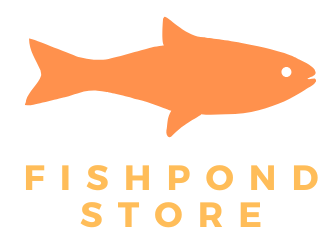As a fish keeper, have you ever wondered how often do you feed fish in a pond? As the proud owner of a pond teeming with colorful fish, it may pose a concern that you are feeding them too much or not enough.
Well, we have the answer to your piscine predicament. We are going to delve into the optimal feeding frequency for fish in a pond, ensuring that your aquatic companions remain healthy and happy. So, let’s go discover the perfect feeding schedule for your finned friends.
Factors to Consider
When it comes to feeding fish in a pond, there are several important factors that you need to consider. These factors include the fish species, water temperature, fish size, and water quality. Each of these factors plays a crucial role in determining the feeding frequency and the amount of food that should be given to the fish.
Fish species
The type of fish species in your pond is an essential factor to consider when establishing a feeding routine. Different species have varying dietary needs and feeding habits. For example, herbivorous fish like koi and goldfish require a diet rich in plant matter, while carnivorous fish such as bass and trout need a diet consisting of meat or insects. Understanding the specific dietary requirements of your fish species is crucial in ensuring their overall health and well-being.
Water temperature
Water temperature is another factor that greatly affects the feeding frequency of your fish. The metabolism of fish is directly influenced by the temperature of the water they inhabit. In colder temperatures, fish have slower metabolic rates and therefore require less frequent feedings. Conversely, in warmer temperatures, fish have higher metabolic rates, meaning they require more regular feedings. It is important to monitor the water temperature and adjust the feeding frequency accordingly to ensure optimal nutrition for your fish.
Fish size
The size of your fish also plays a significant role in determining their feeding requirements. Smaller fish have faster metabolisms and therefore need to be fed more frequently compared to larger fish. This is because smaller fish have higher energy needs relative to their body size. On the other hand, larger fish have slower metabolisms and can be fed less often. It is essential to consider the size of your fish when establishing a feeding schedule to ensure they receive the appropriate amount of food.
Water quality
Water quality is vital for the overall health and well-being of your fish. Poor water quality can lead to various health issues and impact the fish’s appetite. It is important to regularly test the water parameters such as ammonia, nitrate, pH levels, and oxygen levels. If the water quality is compromised, it can affect the fish’s ability to digest food properly. Maintaining good water quality is crucial in ensuring that the fish can fully benefit from the food provided.
Feeding Frequency Guidelines
Establishing the correct feeding frequency for your fish is essential to maintain their health and growth. The feeding frequency can vary depending on the factors mentioned above, such as fish species, water temperature, fish size, and water quality. Here are some general guidelines to help you determine the appropriate feeding frequency for your pond fish.
Daily feeding
Daily feeding is recommended for most pond fish, especially during the warmer months. This ensures that the fish receive a consistent source of nutrition and helps promote their growth and overall health. Daily feeding is particularly important for smaller fish, as they have higher metabolic rates and may require more frequent meals to meet their energy needs.
Alternate day feeding
Alternate day feeding is a suitable feeding frequency for larger fish or when the water temperature is cooler. It provides adequate nutrition while allowing the fish to have periods of fasting. This can be beneficial for their digestion and overall well-being. It is important to remember that even when feeding every other day, the quantity of food should still be appropriate for the fish’s size and dietary needs.
Weekly feeding
Weekly feeding is suitable for some fish species, such as koi, during the winter months when the water temperature is colder. During this time, the fish have a slower metabolism and require less food. Feeding once a week ensures that they still receive some nutrition while minimizing the risk of overfeeding or water quality issues.
Seasonal feeding
Seasonal feeding refers to adjusting the feeding frequency and quantity based on the specific needs of the fish during different seasons. For example, during the winter months, the metabolic rate of fish decreases, and they require less food. On the other hand, during the summer months, fish have higher energy needs and may require more frequent feedings.
Monitoring the water temperature and adjusting the feeding schedule accordingly will help ensure the fish’s nutritional needs are met throughout the year.
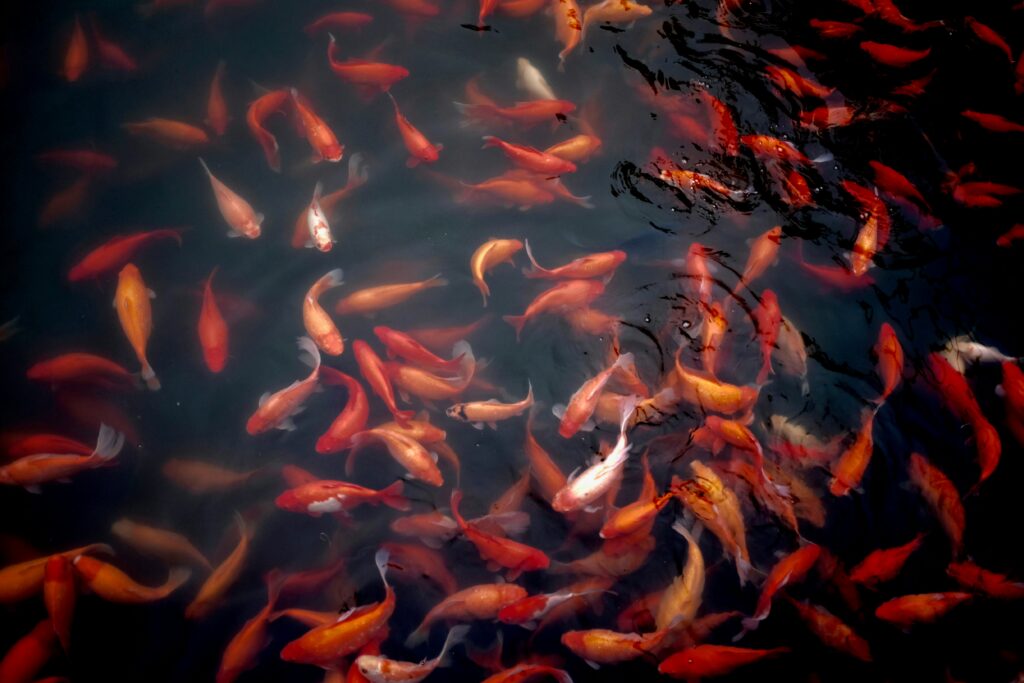
Daily Feeding
Daily feeding is essential for the proper growth and maintenance of your pond fish. The feeding routine can vary depending on the fish species and size.
Smaller fish
For smaller fish, it is important to feed them several small meals throughout the day. This allows them to consume the appropriate amount of food without causing any digestive issues. Small fish have higher metabolic rates and need frequent feedings to meet their energy needs. It is recommended to feed them small portions of fish food two to three times a day, ensuring that they consume the food within a few minutes.
Larger fish
Larger fish have slower metabolisms and can be fed larger portions of food. They do not require as frequent feedings as smaller fish. Feeding them once or twice a day with larger portions of fish food is generally sufficient. It is important to monitor their feeding behavior and adjust the quantity of food accordingly to prevent overeating and potential health issues.
Alternate Day Feeding
Alternate day feeding is a feeding routine that allows the fish to have periods of fasting while still receiving adequate nutrition.
Balanced diet
When feeding your fish every other day, it is crucial to provide them with a balanced diet. This means offering a mix of appropriate fish food such as pellets, flakes, or live/frozen food. A balanced diet ensures that your fish receive the necessary nutrients, vitamins, and minerals they need to thrive. Consulting a fish expert or researching the specific dietary requirements of your fish species can help you determine the most suitable food options to include in their diet.
Amount of food
When feeding your fish every other day, it is important to ensure that you are providing them with an appropriate amount of food. Overfeeding can lead to water pollution, whereas underfeeding can result in poor growth and health issues. It is advisable to monitor your fish’s feeding behavior and adjust the quantity of food accordingly. The goal is to provide enough food to satisfy their hunger without excess that could lead to health problems.
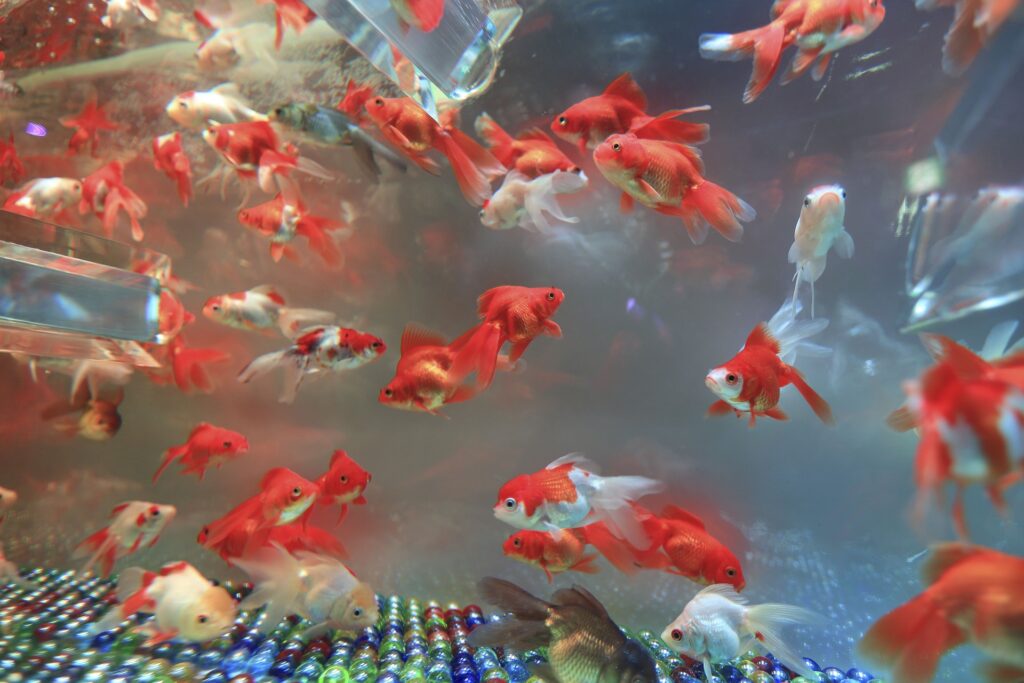
Weekly Feeding
Weekly feeding is typically applicable during the winter months when the water temperature is colder, and fish have slower metabolisms.
Feeding schedule
During weekly feeding, fish should be fed once a week with a small portion of food. This routine ensures that the fish receive some nutrition while minimizing the potential issues associated with overfeeding. It is essential to adjust the quantity of food based on the fish’s size and dietary needs, while also considering the water temperature.
Quantity of food
When feeding once a week, it is crucial to provide an appropriate quantity of food that meets the fish’s nutritional requirements. Underfeeding can result in poor growth and health issues, while overfeeding can lead to water pollution and other associated risks. Observing the fish’s behavior and adjusting the quantity of food accordingly will help ensure that they receive the right amount of nutrition without any adverse effects.
Seasonal Feeding
Seasonal feeding involves adjusting the feeding routine according to the specific needs of the fish during different seasons.
Winter feeding
During the winter months, when the water temperature is colder, fish have slower metabolisms and require less food. It is important to feed them less frequently to prevent overfeeding and potential health issues. Feeding once or twice a week with appropriate portions of food is generally sufficient during this time. Monitoring the water temperature and the fish’s behavior can help determine if any adjustments to the feeding routine are necessary.
Summer feeding
During the summer months, fish have higher energy needs due to their increased activity levels and metabolic rates. They may require more frequent feedings to meet their nutritional requirements. Feeding once or twice a day in smaller portions can help ensure that their energy needs are adequately met. Monitoring the fish’s feeding behavior and making adjustments as needed will help maintain their health and well-being during the warmer months.
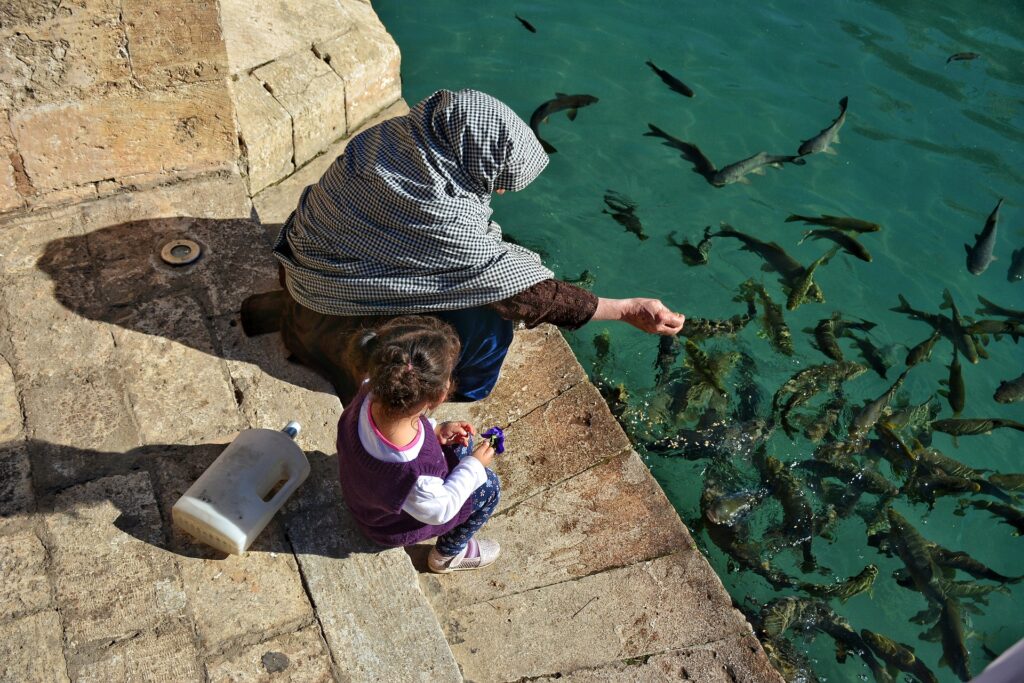
Overfeeding Risks
Overfeeding fish in a pond can lead to various risks and complications that can harm the fish and the overall ecosystem of the pond.
Water pollution
Overfeeding is a common cause of water pollution in ponds. When excessive food is provided, the uneaten leftovers sink to the bottom and decompose, releasing harmful substances such as ammonia and nitrate. These substances can negatively impact the water quality and lead to increased algae growth, oxygen depletion, and overall poor water conditions for the fish.
Algae bloom
Overfeeding contributes to the excessive growth of algae in ponds. When there is an abundance of nutrients from uneaten food, algae thrive and multiply rapidly. Algae blooms can lead to detrimental effects on the pond ecosystem, including oxygen depletion and the production of harmful toxins. These conditions can be harmful to fish and other aquatic organisms, disrupting the natural balance of the pond.
Health issues
Overfeeding can cause several health issues for fish. It can lead to bloating, swim bladder problems, and digestive disorders. Additionally, overweight fish are more susceptible to diseases and infections. It is crucial to avoid overfeeding to protect the health and well-being of your pond fish.

Signs of Underfeeding
Underfeeding fish can also have negative impacts on their growth and overall health. It is important to monitor their behavior and look out for signs of underfeeding.
Poor growth
One of the most noticeable signs of underfeeding is poor growth. If the fish are not receiving sufficient nutrition, their growth may be stunted, and they may appear smaller than expected compared to their age and species. Lack of proper nutrition can also impact their overall development and vitality.
Lethargy
Underfed fish may exhibit lethargic behavior. They may appear less active, have reduced swimming or feeding activity, and spend more time resting at the bottom of the pond. Lethargy is an indication that the fish are not receiving enough energy and nutrients to sustain their normal activities.
Reduced appetite
If you notice your fish showing little to no interest in food, it may be a sign of underfeeding. Fish that are not getting enough food may display a decreased appetite or completely refuse to eat. It is important to address underfeeding promptly to ensure the fish receive the necessary nutrition for their well-being.
Tips for Proper Feeding
Proper feeding of fish in a pond is essential for their health and well-being. Here are some tips to help you establish a suitable feeding routine:
Observe fish behavior
Regularly observe the behavior of your pond fish while feeding. Pay attention to their feeding activity, appetite, and overall behavior. This will help you determine if the feeding frequency and quantity are appropriate. Adjustments can be made based on their response and behavior.
Use appropriate fish food
Choose high-quality fish food that is suitable for the species and size of your pond fish. Different fish require different nutritional needs, and it is important to provide them with a balanced diet that meets their specific requirements. Consult a fish expert or research the dietary needs of your fish species to ensure you are choosing the right type of food.
Avoid overfeeding
It is crucial to avoid overfeeding your fish. Provide them with the appropriate portion sizes and avoid excessive amounts of food that can lead to water pollution, algae blooms, and health issues. Monitor their feeding behavior to determine the optimal quantity of food to provide.
Maintain water quality
Good water quality is crucial for the health and well-being of your pond fish. Regularly test the water parameters such as ammonia, nitrate, pH levels, and oxygen levels to ensure they are within the suitable range for your fish. Regular water changes and proper filtration are also important to maintain optimal water quality.
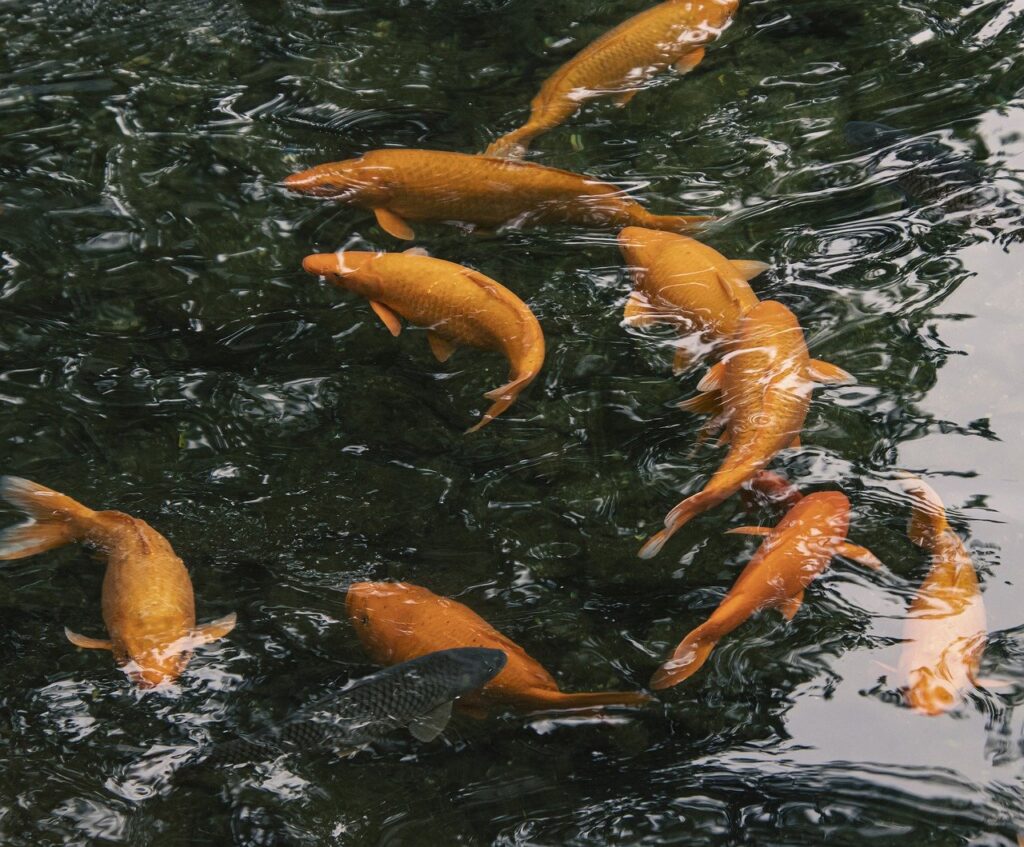
Seeking Expert Advice
If you are unsure about the feeding requirements of your pond fish or need further guidance, there are several resources available to seek expert advice.
Consulting a fish expert
Consulting a fish expert, such as a veterinarian or a professional fish breeder, can provide valuable insights and recommendations specific to your fish species and pond conditions. They have the expertise and knowledge to guide you in establishing a suitable feeding routine and addressing any concerns or issues regarding your fish’s health and nutrition.
Joining online forums
Online fishkeeping forums and communities are excellent platforms to connect with fellow fish enthusiasts and experts. Participating in these forums allows you to seek advice, share experiences, and learn from others’ knowledge. It is a great way to stay updated on the latest information and best practices in pond fish feeding.
Attending workshops or seminars
Attending workshops or seminars on pond fishkeeping and nutrition can provide you with valuable insights and practical knowledge. These events are often organized by fishkeeping associations, aquarium societies, or local pet stores. By participating in these educational opportunities, you can deepen your understanding of proper fish feeding techniques and gain expert advice directly from knowledgeable speakers.
How Often Do You Feed Fish In A Pond
In conclusion, establishing the right feeding routine for your pond fish is essential for their health and well-being. Consider factors such as fish species, water temperature, fish size, and water quality when determining the feeding frequency and quantity.
Daily feeding is generally recommended, but adjusting the routine based on the specific needs of your fish and seasonal variations is important. Avoid overfeeding to prevent water pollution, algae blooms, and health issues, while monitoring for signs of underfeeding. Follow the tips for proper feeding and seek expert advice when needed to ensure the optimal nutrition and care for your pond fish.
So, there you have it, you now know how often to feed your fish in your pond. If you need any further information, please take a look at ‘How Long Can Fish Live In A Pond‘.
